At Veltex Recovery Group, we believe that recovery isn’t just about breaking free from substances—it’s about rebuilding the body, mind, and spirit. That’s why physical health, brain science, and structured support all play a central role in our treatment philosophy.
Why Fitness Supports Recovery
Exercise is more than a lifestyle choice—it’s a powerful recovery tool. Regular physical activity can reduce cravings, improve mood, and boost self-confidence. It supports stress management, emotional balance, and sleep regulation.
Our newly upgraded gym at our Mount Hope, WV facility offers high-quality, accessible equipment for every fitness level. Whether clients participate in guided group workouts, yoga, strength training, or a simple walk on the treadmill, movement becomes part of a daily routine that fosters structure and stability.
Fitness at Veltex is not just a program. It’s a symbol of reclaiming strength and practicing self-care.
Understanding the ASAM Levels of Care
Veltex is licensed to provide residential treatment at ASAM Levels 3.1 and 3.5, with expanding 3.7 detox capabilities. But what does that mean?
The American Society of Addiction Medicine (ASAM) developed these levels to define the intensity of care:
- Level 3.1 – Low-intensity residential care: For clients who benefit from a structured, sober environment with limited clinical supervision.
- Level 3.5 – High-intensity residential care: For individuals needing 24-hour structure and comprehensive clinical support.
- Level 3.7 – Medically monitored inpatient detox: Staffed by medical professionals to manage withdrawal symptoms and ensure safety.
This tiered system allows Veltex to meet clients exactly where they are in their recovery journey.
What to Expect During Admission
We know that entering treatment can feel overwhelming. That’s why our admissions process is transparent, trauma-informed, and supportive.
Here’s what to expect:
- Pre-Admission Call: We gather background info, explain eligibility, and answer questions.
- Assessment: Upon arrival, clients receive a full clinical and medical evaluation.
- Orientation: We walk through the facility, introduce staff, and explain rules and routines.
- Medical Screening: Licensed nurses assess health and safety.
- Personalized Care Plan: Individualized plans are created from day one.
At Veltex, you’re not just a patient—you’re part of a healing community.
Spotlight: “Being Sober” by Dr. Harry Haroutunian
Our leadership includes Dr. Harry Haroutunian, a nationally respected addiction physician and former director at the Betty Ford Center. His book, Being Sober, offers guidance rooted in both medical expertise and lived experience.
The book addresses cravings, structure, and emotional resilience—pillars that mirror our own residential program in Mount Hope.
The Brain: Where Addiction Lives—and Heals
Addiction is a brain disorder, not a moral failing. It affects blood flow, neurotransmitter balance, and impulse control. In Unchain Your Brain, Dr. Daniel Amen explores how trauma and substance use physically rewire the brain.
“If your brain is not right, your relationships won’t be right. Your decisions won’t be right. Your life won’t be right.” — Dr. Daniel Amen
At Veltex, we teach women about their neurobiology so they can replace shame with empowerment and reclaim control.
The Gut-Brain Connection: Nutrition as Neurochemical Fuel
The gut and brain are constantly communicating. What we eat affects how we feel, think, and even how we heal.
Veltex’s nutrition program:
- Stabilizes blood sugar with protein and complex carbs
- Boosts brain health with omega-3s from salmon, flaxseed, and walnuts
- Supports dopamine and serotonin through amino acid-rich foods
- Eliminates neurotoxins like artificial sweeteners, MSG, and trans fats
“Low-fat, high-sugar diets are not only bad for your waistline—they’re a disaster for your brain.” — Dr. Daniel Amen
Personalized Nutrition: Testing and Supplements
We don’t guess—we test. Lab assessments often include:
- Vitamin B12, B6, and folate (for neurotransmitters)
- Magnesium and zinc (linked to mood and focus)
- Adrenal and cortisol levels
Our clinicians use this data to create tailored supplementation plans that align with healing the brain and body.
Rewiring Daily: Movement, Sleep & Mindfulness
Recovery requires daily practice. Inspired by Dr. Amen’s 10 brain-health strategies, we embed key routines into each client’s care:
- Mindfulness meditation to boost prefrontal cortex health
- Sleep support to regulate emotion and memory
- Daily exercise to increase blood flow and resilience
- Cognitive Behavioral Therapy (CBT) to challenge unhelpful thought patterns
Meals That Heal
At Veltex, meals aren’t just nutrition—they’re a healing ritual. Shared meals nourish the brain, body, and community. It’s part of how we build connection and purpose.
From Knowledge to Empowerment
Unchain Your Brain helps clients move from diagnosis to direction. At Veltex, we combine science with compassion to build a recovery environment that heals the whole person.
We don’t just treat addiction. We restore lives—starting with the brain.
Further Resources
- Unchain Your Brain by Dr. Daniel Amen
- Amen Clinics Research
- Veltex Recovery Group Nutrition & Wellness Model
About the Author
Dr. Debra Beirne is Medical Director at Veltex Recovery Group with over 20 years of experience in addiction medicine, psychiatry, and women’s health. She leads a trauma-informed, brain-based approach to long-term recovery.







